英语各种词性前后缀及习题汇编
常见前缀与后缀 英语 附加习题及答案
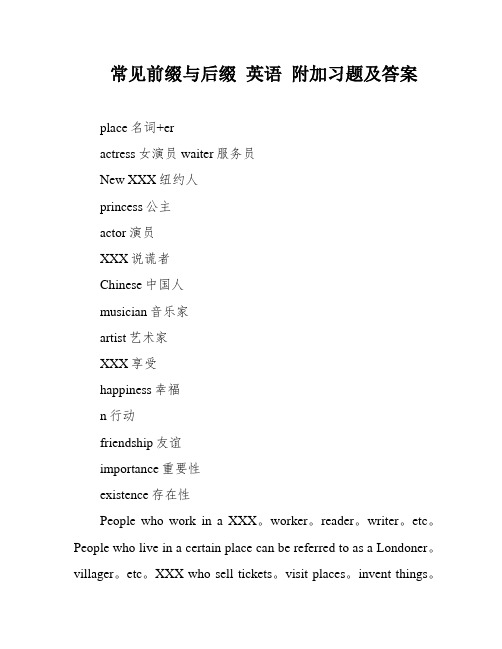
常见前缀与后缀英语附加习题及答案place名词+eractress女演员waiter服务员New XXX纽约人princess公主actor演员XXX说谎者Chinese中国人musician音乐家artist艺术家XXX享受happiness幸福n行动friendship友谊importance重要性existence存在性People who work in a XXX。
worker。
reader。
writer。
etc。
People who live in a certain place can be referred to as a Londoner。
villager。
etc。
XXX who sell tickets。
visit places。
invent things。
act。
or survive XXX as a conductor。
visitor。
inventor。
actor。
or survivor。
respectively。
People who edit or beg for a living can be XXX to as Chinese。
Japanese。
etc。
People who work inXXX as a musician。
physician。
scientist。
dentist。
etc。
People who hold XXX。
The state of being happy or ill can be XXX。
The state of being a XXX can also be formed by adding the suffix -ful。
XXX suffixes like -al。
-an。
-ern。
-able。
-ful。
-ish。
-ive。
-y。
-en。
-ous。
-ary。
-ic。
-some。
-like。
-ly。
or -less to certain root words。
英语词性转换及前后缀【整理】

英语词性转换归纳动词变名词1.v+ ment 结尾在动词词尾加上-ment 变成名词achieve---achievement 成就 advertise--- advertisement// advertising agree—(in )agreement apartment 公寓 amusement 娱乐commit奉献—commitment compliment 称赞,恭维 develop---development disgree—disagreement department 局,部 experiment 实验,试验equip 装备---equipment 装备,器材govern 统治—government 政府manage---management 经营管理有些单词比较特殊,需把动词后的e去掉再加ment.例如:argue—argument(争论)2.V+ tion 结尾在动词词尾加上-(t)ion/(s)ion变成名词attract吸引—attraction 有吸引力的事或人;令人向往的地方conclude—conclusion 结论compete—competition 竞争,比赛discuss—discussion 讨论 graduate 毕业—graduationdecide----decision describe—description描写,描绘 (特例,不规则变化) express 表达----expression 词语;表达方式educate-----education operate 操作,动手术—operation(去e再加"ion") organize----organization(把e改成其他字母再加"tion")instruct—instruction指导,介绍 invent—inventor / invention invite—invitation inspire---inspiration 灵感,鼓舞人心的pollute----pollution 污染 predict---prediction 预言pronounce ---pronunciation resolve 决心-----resolution 决心permit 允许-----permission suggest-建议,暗示--suggestionsolve解决-----solution 解决方法3.V+ ance 结尾appear—appearance 外貌,出现 perform----performance 演出accept—acceptance 接受4.V+ ing 结尾 (方法与动词变为现在分词的方法相同)meet—meeting build—building wait—waiting wash—washing bathe 洗澡---bathingend 结束----ending 结尾,结局 train 训练---trainingmean ---- meaning 意义 say-----saying 谚语注意:以重读闭音节结尾,且末尾只有一个辅音字母的动词,应双写末尾的辅音字母,再加-ingswim—swimming shop—shopping begin—beginning5.V+ 其他succeed—success(成功) Beg(乞讨)—beggar 乞丐behave 行为,举止----behavior fly—flight 飞行 heat 加热---heat 热量 know---knowledge tour ---tour 旅游/ tourist 游客hit 撞击------hit 轰动一时的人或物,碰撞 mix 混合-----mixture 混合物press 按,压—pressure 压力 sit-----seat 座位succeed—successtour 在……旅游,在……作巡回演出直接+地点动词(v.)→形容词(adj.)1动词后面加able,以e结尾的动词则去e加able,表示具有此性质,特点或属性. 例如: afford-affordable;love-lovable2动词后面加ed,以e结尾的动词则直接加d,表示被动性的属性或特点.例如: scatter-scattered use-used3不规则的动词则必须记忆,记住其过去分词形式.规律不大,意义同(b).名词变形容词1名词+y(a) (尤其是一些与天气有关的名词)anger 生气-----angry hunger---hungry guilt 罪恶---guilty 内疚的health---healthy luck---lucky cloud---cloudywind—windy rain---rainy snow---snowytourist------touristy 游客多的 business---busysalt 盐--- salty 咸的 silk 丝绸—silky 丝绸般的sleep---sleepy 昏昏欲睡的注意:1)如果以重读闭音节结尾,且词尾只有一个辅音字母,这时应双写辅音字母再加"-y".sun—sunny, fun—funny, fog—foggy有雾的 fur—furry毛皮的2)少数以不发音的e结尾的名词变为形容词时,应去掉e再加"-y". noise—noisy, ice—icy, shine—shiny(发亮的), taste(口味)—tasty(甜的)2.名词+ ed 名词后面加-ed,以e结尾的直接加d.balance –balanced 平衡的spot 斑点,地点----spotted 有斑点的talent-----talented 有天赋的organized 有组织的distusted 厌恶的offended 生气的crowded 拥挤的polluted 被污染的 pleased 高兴的3.名词+ ful/less 一些抽象名词在词尾加-ful可以变为形容词在名词后加-less构成含有否定意义的形容词meaning—meaningful 有意义的 care—careful/ careless 小心的;粗心的help---helpful / helpless home—homeless 无家可归的colour---colourful pain 疼痛---painful 痛苦的use---useless/ useful thank—thankful 充满感激的peace 和平 ---- peaceful 平静的,宁静的 playful 顽皮的,爱玩耍的4.名词+ able名词如果以e结尾就去e再加"-able".adjustable 可调整 knowledge---knowledgeable comfort---comfortablesuit 一套-----suitable 合适的 value—valuable有价值的5.名词+ ousenormous 巨大的 danger—dangerousmystery 神秘-----mysterious 神秘的6.ce 变 tconfidence----confident difference---different silence—silent, 7. al 结尾medicine 药----medical 医学的(这个比较特殊)music---musical nature---natural 自然的person---personal私人的nation—national 国家的education---educational有教育意义的tradition----traditional 传统的 origin起源---original 新颖的;独创的8.名词+ lyfriend—friendly live---lively 活跃的,有生气的love—lovely 可爱的9.+ en 结尾wood—wooden 木制的 wool—woolen 羊毛的10.一些表示国家的名词可以在词尾加-ese, -ish或-n构成表示国籍,语言的形容词China—Chinese, Japan—Japanese, England—English,America—American, India—Indian, Australia —Australian(注意Canada—Canadian)11. 其他energy精力---energetic fool 傻子—foolish 愚蠢的freedom 自由—free 空的,免费的 death---deadheight 高度—high illness 疾病--- ill love—loving 慈爱的pleasure---pleasant / pleased popularity 流行性—popular pride---proudscientist----scientific 科学的方位的词表达名词—形容词East—eastern West—western South—southern North---northern In the west of China In the western part of China四大洲名词-----形容词Asia 亚洲--Asian Africa 非洲--- African Europe欧洲--- European America 美洲-----American形容词变副词1.形容词+ lybad—badly bright—brightly明亮地 casual—casually 随意地clear—clearly清楚地complete—completely 完全correct---correctly 正确地 final--finallyfortunate—fortunately幸运地 general—generally 一般来讲loud—loudly particular 特殊的,独特的—particularlypolite—politely proper 合适的,恰当的---properlymain----mainly主要地 most 多数-----mostly 多半,大多数normal---normally 正常地 quick—quickly quiet—quietly 轻轻地,安静地real—really recent 最近的----recently最近;近来hard 难的;努力地---hardly 几乎不 late 迟的—lately最近;近来sad—sadly slow---slowly special—specially 专门,特殊地specific---specifically 特定地,明确地 usual—usually strong—strongly 坚决地,强烈地 sudden—suddenly突然2.以-ble或-le结尾的形容词,去掉e加-ycomfortable---comfortably gentle—gently possible---possibly simple ----simply 仅仅;只;简单地 terrible---terribly3.辅音字母+ y 变 ilyeasy—easily heavy—heavily happy--happily angry—angrily, lucky —luckily, noisy—noisily4.少数以e结尾的形容词,要去掉e再加-lytrue—truly但绝大多数以e结尾的形容词仍然直接加-ly例如: polite—politely, wide—widely5.以-l结尾的形容词变为副词时要在词尾加-ly,以-ll结尾的才在词尾只加-y. usual—usually, careful—carefully, useful—usefullyfull—fully (以-ll结尾的才只加y)6.特殊good—well好地 well 身体健康的,井 true—truly名词---形容词—副词beauty 美,美人—beautiful—beautifully care—careful—carefully care—careless—carelessly difference---different---differently happiness—happy—happily hunger—hungry—hungrilyhealth—healthy—healthily luck—lucky—luckily noise—noisy—noisily pride—proud—proudly骄傲地sadness—sad—sadly safety 安全;安全的地方—safe—safely silence—silent---silently 默默地success—successful—successfully truth—true—truly unluck—unlucky—unluckily wonder 奇迹—wonderful—wonderfully既是形容词又是副词early get up early ;an early trainlate be late for class come late for schooldeep dive deep into the sea a deep holehigh jump high; a high mountainhard a hard question;a hard stone work hard / study hard rain hardlong It takes too long It takes a long timefar jump far My home is far from schoolstraight a straight line go straight along here*******前缀*********a-,an-①无,不,非 astable不稳定的 acentric无中心的②含有in,on,at,by,with,to等意义asleep在熟睡中 ahead向前ab- 脱离 abnormal不正常的 abaxial离开轴心的anti- 反抗 antiwar反战的 anti-imperialist反帝的auto- 自动,自己 autobiography自传 autostable自动稳定be- 使…加强 belittle使缩小 befriend友好相待bi- 二,双 biweekly双周刊 biligual两种语言的co,col,com,con,cor 共同 cooperation协作 collaboration协作,勾结 combine 联合 correlation相互关系counter-,contra- 反,对应 counteraction反作用 contrast对比,对照di-,dif-,dis- 否定,相反 diffident不自信的 dislike不喜欢en,em- 使… enlarge扩大 enable使…能 empower使…有权力e-,ex- 外,出 external外部的 erupt喷出extra- 以外,超过 extraordinary格外的 extrasolar太阳系以外的hyper- 在上,超 hyperfrequency超高频 hypersonic超声的il-,im-,in-,ir- 否定 illogical不合逻辑的 impossible不可能的 invisible 不可见irrational不合理的inter- 互相 interchange交换 interlock连锁intra-,intro- 在内,内部 intrapersonal个人内心的 introspect内省mal- 恶,不良 maltreat虐待 malfunction机能失常micro- 微 microscrope显微镜 microware微波mid- 中,中间 mid air半空中 midstream中流mini- 小 minibus小公共汽车 ministate小国mis- 错,坏 mistake错误 misspell拼错multi- 多 multiparty多党的 multilingual多种语言的non- 否定 nonsmoker不抽烟的人 nonexistent不存在的out- 超过,过度,外,出,除去 outgo走得比…远 outgrow长得太大 outdoor 户外的 outroot除根over- 上,过度 overwork工作过度 overbridge天桥post- 后 postwar战后 postnatal诞生后的pre- 前,领先 prewar战前的 prefix前缀re- 回,再 return返回 restart重新开始semi- 半 semicircle半圆 semiconductor半导体sub-,suc-,suf-,sup- 次,亚,在下,低于 substandard低于标准规格的 succeed 继承 suffix后缀 supplement增补trans- 转换,变换,横过,越过 transmit传送 transatlantic横渡大西洋的tri- 三 tricar三轮车 triangle三角(形)un- 否定 unstable不稳定的 unknown未知的under-下,内(指衣服),不足underground地下的 underskirt衬裙 underpay付资不足uni- 单一 uniform均匀的 unipolar单极的英语中常见的后缀一、名词性后缀1,-age为抽象名词后缀,表示行为,状态和全体总称percentage百分数,百分率,voltage电压,伏特数,lavage灌洗,洗,出法,gavage 管词法,curettage刮除法,shortage不足,缺少。
英语词性转换及前后缀【整理】
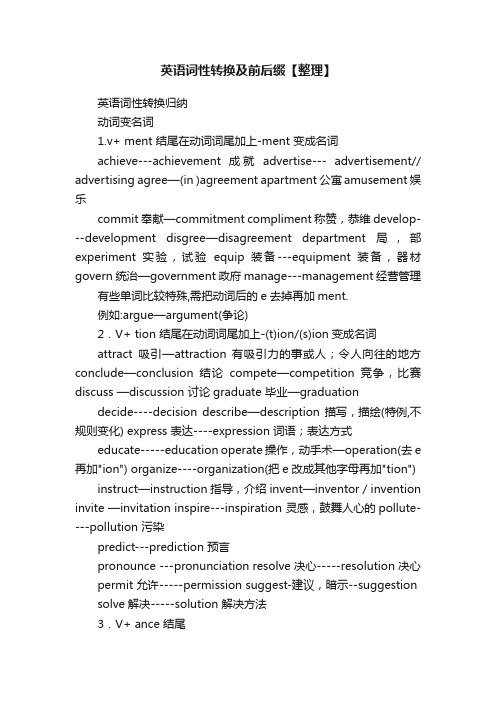
英语词性转换及前后缀【整理】英语词性转换归纳动词变名词1.v+ ment 结尾在动词词尾加上-ment 变成名词achieve---achievement 成就advertise--- advertisement// advertising agree—(in )agreement apartment 公寓amusement 娱乐commit奉献—commitment compliment 称赞,恭维develop---development disgree—disagreement department 局,部experiment 实验,试验equip 装备---equipment 装备,器材govern 统治—government 政府manage---management 经营管理有些单词比较特殊,需把动词后的e去掉再加ment.例如:argue—argument(争论)2.V+ tion 结尾在动词词尾加上-(t)ion/(s)ion变成名词attract吸引—attraction 有吸引力的事或人;令人向往的地方conclude—conclusion 结论compete—competition 竞争,比赛discuss —discussion 讨论graduate 毕业—graduation decide----decision describe—description描写,描绘(特例,不规则变化) express 表达----expression 词语;表达方式educate-----education operate 操作,动手术—operation(去e 再加"ion") organize----organization(把e改成其他字母再加"tion") instruct—instruction指导,介绍invent—inventor / invention invite —invitation inspire---inspiration 灵感,鼓舞人心的pollute----pollution 污染predict---prediction 预言pronounce ---pronunciation resolve 决心-----resolution 决心permit 允许-----permission suggest-建议,暗示--suggestion solve解决-----solution 解决方法3.V+ ance 结尾appear—appearance 外貌,出现perform----performance 演出accept—acceptance 接受4.V+ ing 结尾(方法与动词变为现在分词的方法相同)meet—meeting build—building wait—waitingwash—washing bathe 洗澡---bathingend 结束----ending 结尾,结局train 训练---trainingmean ---- meaning 意义say-----saying 谚语注意:以重读闭音节结尾,且末尾只有一个辅音字母的动词,应双写末尾的辅音字母,再加-ingswim—swimming shop—shopping begin—beginning5.V+ 其他succeed—success(成功) Beg(乞讨)—beggar 乞丐behave 行为,举止----behavior fly—flight 飞行heat 加热---heat 热量know---knowledge tour ---tour 旅游/ tourist 游客hit 撞击------hit 轰动一时的人或物,碰撞mix 混合-----mixture 混合物press 按,压—pressure 压力sit-----seat 座位succeed—successtour 在……旅游,在……作巡回演出直接+地点动词(v.)→形容词(adj.)1动词后面加able,以e结尾的动词则去e加able,表示具有此性质,特点或属性.例如: afford-affordable;love-lovable2动词后面加ed,以e结尾的动词则直接加d,表示被动性的属性或特点.例如: scatter-scattered use-used3不规则的动词则必须记忆,记住其过去分词形式.规律不大,意义同(b).名词变形容词1名词+y(a) (尤其是一些与天气有关的名词)anger 生气-----angry hunger---hungry guilt 罪恶---guilty 内疚的health---healthy luck---lucky cloud---cloudywind—windy rain---rainy snow---snowytourist------touristy 游客多的business---busysalt 盐--- salty 咸的silk 丝绸—silky 丝绸般的sleep---sleepy 昏昏欲睡的注意:1)如果以重读闭音节结尾,且词尾只有一个辅音字母,这时应双写辅音字母再加"-y".sun—sunny, fun—funny, fog—foggy有雾的fur—furry毛皮的2)少数以不发音的e结尾的名词变为形容词时,应去掉e再加"-y".noise—noisy, ice—icy, shine—shiny(发亮的), taste(口味)—tasty(甜的)2.名词+ ed 名词后面加-ed,以e结尾的直接加d.balance –balanced 平衡的spot 斑点,地点----spotted 有斑点的talent-----talented 有天赋的organized 有组织的distusted 厌恶的offended 生气的crowded 拥挤的polluted 被污染的pleased 高兴的3.名词+ ful/less 一些抽象名词在词尾加-ful可以变为形容词在名词后加-less构成含有否定意义的形容词meaning—meaningful 有意义的care—careful/ careless 小心的;粗心的help---helpful / helpless home—homeless 无家可归的colour---colourful pain 疼痛---painful 痛苦的use---useless/ useful thank—thankful 充满感激的peace 和平---- peaceful 平静的,宁静的playful 顽皮的,爱玩耍的4.名词+ able名词如果以e结尾就去e再加"-able".adjustable 可调整knowledge---knowledgeable comfort---comfortablesuit 一套-----suitable 合适的value—valuable有价值的5.名词+ ousenormous 巨大的danger—dangerousmystery 神秘-----mysterious 神秘的6.ce 变tconfidence----confident difference---different silence—silent,7. al 结尾medicine 药----medical 医学的(这个比较特殊)music---musical nature---natural 自然的person---personal私人的nation—national 国家的education---educational有教育意义的tradition----traditional 传统的origin起源---original 新颖的;独创的8.名词+ lyfriend—friendly live---lively 活跃的,有生气的love—lovely 可爱的9.+ en 结尾wood—wooden 木制的wool—woolen 羊毛的10.一些表示国家的名词可以在词尾加-ese, -ish或-n构成表示国籍,语言的形容词China—Chinese, Japan—Japanese, England—English, America—American, India—Indian, Australia —Australian(注意Canada—Canadian)11. 其他energy精力---energetic fool 傻子—foolish 愚蠢的freedom 自由—free 空的,免费的death---deadheight 高度—high illness 疾病--- ill love—loving 慈爱的pleasure---pleasant / pleased popularity 流行性—popular pride---proudscientist----scientific 科学的方位的词表达名词—形容词East—eastern West—western South—southern North---northern In the west of China In the western part of China四大洲名词-----形容词Asia 亚洲--Asian Africa 非洲--- African Europe欧洲--- European America 美洲-----American形容词变副词1.形容词+ lybad—badly bright—brightly明亮地casual—casually 随意地clear—clearly清楚地complete—completely 完全correct---correctly 正确地final--finallyfortunate—fortunately幸运地general—generally 一般来讲loud—loudly particular 特殊的,独特的—particularlypolite—politely proper 合适的,恰当的---properlymain----mainly主要地most 多数-----mostly 多半,大多数normal---normally 正常地quick—quickly quiet—quietly 轻轻地,安静地real—really recent 最近的----recently最近;近来hard 难的;努力地---hardly 几乎不late 迟的—lately最近;近来sad—sadly slow---slowly special—specially 专门,特殊地specific---specifically 特定地,明确地usual—usuallystrong—strongly 坚决地,强烈地sudden—suddenly突然2.以-ble或-le结尾的形容词,去掉e加-ycomfortable---comfortably gentle—gently possible---possiblysimple ----simply 仅仅;只;简单地terrible---terribly3.辅音字母+ y 变 ilyeasy—easily heavy—heavily happy--happily angry—angrily, lucky—luckily, noisy—noisily4.少数以e结尾的形容词,要去掉e再加-lytrue—truly但绝大多数以e结尾的形容词仍然直接加-ly例如: polite—politely, wide—widely5.以-l结尾的形容词变为副词时要在词尾加-ly,以-ll结尾的才在词尾只加-y. usual—usually, careful—carefully, useful—usefully full—fully (以-ll结尾的才只加y)6.特殊good—well好地well 身体健康的,井true—truly名词---形容词—副词beauty 美,美人—beautiful—beautifully care—careful—carefully care—careless—carelessly difference---different---differently happiness—happy—happily hunger—hungry—hungrily health—healthy—healthily luck—lucky—luckily noise—noisy—noisily pride—proud—proudly骄傲地sadness—sad—sadly safety 安全;安全的地方—safe—safely silence—silent---silently 默默地success—successful—successfully truth—true—truly unluck—unlucky—unluckily wonder 奇迹—wonderful—wonderfully既是形容词又是副词early get up early ;an early trainlate be late for class come late for schooldeep dive deep into the sea a deep holehigh jump high; a high mountainhard a hard question;a hard stone work hard / study hard rain hardlong It takes too long It takes a long timefar jump far My home is far from school straight a straight line go straight along here*******前缀*********a-,an-①无,不,非astable不稳定的acentric无中心的②含有in,on,at,by,with,to等意义asleep在熟睡中ahead向前ab- 脱离abnormal不正常的abaxial离开轴心的anti- 反抗antiwar反战的anti-imperialist反帝的auto- 自动,自己autobiography自传autostable自动稳定be- 使…加强belittle使缩小befriend友好相待bi- 二,双biweekly双周刊biligual两种语言的co,col,com,con,cor 共同cooperation协作collaboration协作,勾结combine联合correlation相互关系counter-,contra- 反,对应counteraction反作用contrast对比,对照di-,dif-,dis- 否定,相反diffident不自信的dislike不喜欢en,em- 使… enlarge扩大enable使…能empower使…有权力e-,ex- 外,出external外部的erupt喷出extra- 以外,超过extraordinary格外的extrasolar太阳系以外的hyper- 在上,超hyperfrequency超高频hypersonic超声的il-,im-,in-,ir- 否定illogical不合逻辑的impossible不可能的invisible不可见irrational不合理的inter- 互相interchange交换interlock连锁intra-,intro- 在内,内部intrapersonal个人内心的introspect内省mal- 恶,不良maltreat虐待malfunction机能失常micro- 微microscrope显微镜microware微波mid- 中,中间mid air半空中midstream中流mini- 小minibus小公共汽车ministate小国mis- 错,坏mistake错误misspell拼错multi- 多multiparty多党的multilingual多种语言的non- 否定nonsmoker不抽烟的人nonexistent不存在的out- 超过,过度,外,出,除去outgo走得比…远outgrow长得太大outdoor 户外的outroot除根over- 上,过度overwork工作过度overbridge天桥post- 后postwar战后postnatal诞生后的pre- 前,领先prewar战前的prefix前缀re- 回,再return返回restart重新开始semi- 半semicircle半圆semiconductor半导体sub-,suc-,suf-,sup- 次,亚,在下,低于substandard低于标准规格的succeed继承suffix后缀supplement增补trans- 转换,变换,横过,越过transmit传送transatlantic横渡大西洋的tri- 三tricar三轮车triangle三角(形)un- 否定unstable不稳定的unknown未知的under-下,内(指衣服),不足underground地下的underskirt衬裙underpay付资不足uni- 单一uniform均匀的unipolar单极的英语中常见的后缀一、名词性后缀1,-age为抽象名词后缀,表示行为,状态和全体总称percentage百分数,百分率,voltage电压,伏特数,lavage灌洗,洗,出法,gavage 管词法,curettage刮除法,shortage不足,缺少。
英语前后缀归纳(详细版)

英语前后缀归纳(详细版)2、pre-加在名词,形容词和动词前:preheat(预热)、n(预防)、premature(过早的)3、fore-加在名词,形容词和动词前:foresee(预见)、XXX(祖先)、forehead(前额)4、pro-加在名词,形容词和动词前:proactive(积极主动的)、prosperous(繁荣的)、proceed(继续进行)5、ante-加在名词前:XXX(前事)、XXX(前厅)、antedate(先于)三、表示“后after”的前缀1、post-加在名词,形容词和动词前:postgraduate(研究生)、postpone(推迟)、ar(战后的)2、after-加在名词,形容词和动词前:aftermath(后果)、afternoon(下午)、XXX(事后想法)后缀一、名词后缀1、-ment:表示“状态,行为或结果”,如:enjoyment(享受)、agreement(协议)、movement(运动)2、-ness:表示“状态或品质”,如:happiness(幸福)、kindness(友善)、darkness(黑暗)3、-ity:表示“状态或品质”,如:reality(现实)、XXX(平等)、diversity(多样性)4、-XXX:表示“行为或过程”,如:XXX(教育)、XXX(交流)、XXX(竞争)5、-er/-or:表示“人或物”,如:XXX(教师)、actor(演员)、doctor(医生)二、形容词后缀1、-ful:表示“充满的”,如:colorful(色彩斑斓的)、wonderful(神奇的)、helpful(有帮助的)2、-less:表示“没有的”,如:hopeless(无望的)、useless(无用的)、fearless(无畏的)3、-able/-ible:表示“能够的”,如:comfortable(舒适的)、flexible(灵活的)、visible(可见的)4、-al/-ial:表示“关于的”,如:nal(国家的)、financial(金融的)、social(社会的)5、-ous/us:表示“有…性质的”,如:famous(著名的)、us(美味的)、us(好奇的)1.Pre- means before。
高考英语单词常见前后缀总结

高考英语单词常见前后缀总结一:表示否定的前缀un-否定,不例子:unhappy(不开心),unfair(不公平的),unusual(不寻常的),unknown (未知的),undo(撤销)in-, im-, ir-, il-否定例子:invisible(不可见的),impossible(不可能的),irregular(不规则的),illogical(不合逻辑的),incorrect(不正确的)dis-否定,相反例子:dislike(不喜欢),disagree(不同意),dishonest(不诚实的),disconnect (断开),distrust(不信任)non-否定,不例子:nonstop(不停的),nonfiction(非虚构的),nonsense(无意义的话),nonexistent(不存在的),nonviolent(非暴力的)a-, an-无,不,非例子:amoral(无道德的),asymmetry(不对称),anarchy(无政府状态),anonymous(匿名的),anhydrous(无水的)二:表示“...之前”的前缀pre-前,预先例子:prefix(前缀),prepare(准备),prepay(预付),preview(预览),preexist(先存在)fore-前例子:forecast(预报),foresee(预见),forehead(前额),foretell(预言),forefront(最前线)三:表示“后”的前缀post-后,之后例子:postpone(推迟),postwar(战后的),postgraduate(研究生的),postscript (附言),postmortem(事后分析)四:表示“再一次”的前缀re-再,重新例子:restart(重新开始),review(复习),rebuild(重建),replay(重播),recall(召回)五:其他前缀auto-自动,自己例子:automatic(自动的),autonomy(自治),autograph(亲笔签名),autobiography(自传),autopilot(自动驾驶)bi-二,双例子:bicycle(自行车),bilingual(双语的),biweekly(双周刊),bilateral (双边的),bipolar(双极的)co-, col-, com-, con-, cor-共同例子:cooperate(合作),collaborate(合作),combine(联合),connect(连接),correlate(关联)anti-反抗,对立例子:antiwar(反战的),antibody(抗体),antiseptic(抗菌的),antithesis (对立面),anticlimax(突降)ex-, e-外,出例子:export(出口),emit(发出),exclude(排除),external(外部的),exit(出口)后缀总结一:名词后缀-ment 行为或过程例子:development(发展),management(管理),achievement(成就),agreement (协议),government(政府)-ness 状态,性质例子:happiness(幸福),darkness(黑暗),kindness(仁慈),weakness(弱点),sadness(悲伤)-ion, -tion 动作或状态例子:decision(决定),action(行动),celebration(庆祝),operation(操作),education(教育)-ance, -ence 状态,性质例子:importance(重要性),confidence(自信),existence(存在),resistance (抵抗),dependence(依赖)-ist 从事……职业的人例子:artist(艺术家),scientist(科学家),pianist(钢琴家),novelist(小说家),dentist(牙医)二:动词后缀-ize, -ise 使……化例子:realize(实现),modernize(使现代化),finalize(完成),organize(组织),utilize(利用)-en 使成为……例子:strengthen(加强),shorten(缩短),widen(加宽),broaden(拓宽),deepen(加深)-ify 使……例子:justify(证明……正当),simplify(简化),clarify(澄清),intensify (加剧),verify(核实)三:形容词后缀-able, -ible 可……的,能……的例子:readable(可读的),sensible(可感知的),manageable(可管理的),edible(可食用的),flexible(灵活的)-ful 充满……的例子:joyful(充满喜悦的),careful(小心的),hopeful(充满希望的),useful (有用的),thoughtful(体贴的)-ous, -ious 充满……的,具有……性质的例子:dangerous(危险的),curious(好奇的),famous(著名的),mysterious (神秘的),various(各种各样的)-ic, -ical ……的,属于……的例子:historic(历史的),logical(逻辑的),musical(音乐的),comic(喜剧的),scientific(科学的)-less 无……的例子:hopeless(无望的),careless(粗心的),homeless(无家可归的),fearless (无畏的),meaningless(无意义的)四:副词后缀-ly 以……方式例子:quickly(迅速地),happily(快乐地),sadly(悲伤地),easily(容易地),quietly(安静地)-ward(s) 朝向,向……例子:forward(向前),backward(向后),upward(向上),downward(向下),inward(向内)-wise 以……方式,关于……例子:clockwise(顺时针地),likewise(同样地),otherwise(否则),lengthwise (纵向地),sidewise(横向地)-ily 以……的方式例子:happily(高兴地),lazily(懒惰地),easily(轻易地),crazily(疯狂地),noisily(吵闹地)以上就是常见的英语前缀后缀。
英语单词构词法前后缀
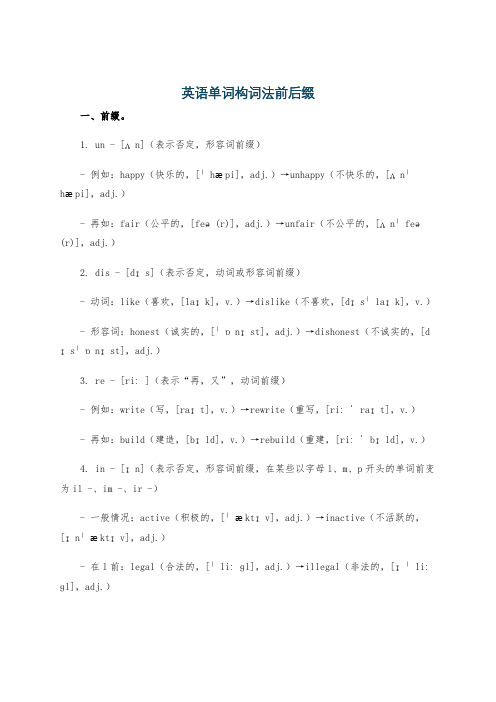
英语单词构词法前后缀一、前缀。
1. un - [ʌn](表示否定,形容词前缀)- 例如:happy(快乐的,[ˈhæpi],adj.)→unhappy(不快乐的,[ʌnˈhæpi],adj.)- 再如:fair(公平的,[feə(r)],adj.)→unfair(不公平的,[ʌnˈfeə(r)],adj.)2. dis - [dɪs](表示否定,动词或形容词前缀)- 动词:like(喜欢,[laɪk],v.)→dislike(不喜欢,[dɪsˈlaɪk],v.)- 形容词:honest(诚实的,[ˈɒnɪst],adj.)→dishonest(不诚实的,[d ɪsˈɒnɪst],adj.)3. re - [riː](表示“再,又”,动词前缀)- 例如:write(写,[raɪt],v.)→rewrite(重写,[riːˈraɪt],v.)- 再如:build(建造,[bɪld],v.)→rebuild(重建,[riːˈbɪld],v.)4. in - [ɪn](表示否定,形容词前缀,在某些以字母l、m、p开头的单词前变为il -、im -、ir -)- 一般情况:active(积极的,[ˈæktɪv],adj.)→inactive(不活跃的,[ɪnˈæktɪv],adj.)- 在l前:legal(合法的,[ˈliːɡl],adj.)→illegal(非法的,[ɪˈliːɡl],adj.)- 在m前:moral(道德的,[ˈmɒrəl],adj.)→immoral(不道德的,[ɪˈm ɒrəl],adj.)- 在r前:regular(规则的,[ˈreɡjələ(r)],adj.)→irregular(不规则的,[ɪˈreɡjələ(r)],adj.)5. pre - [priː](表示“在……之前”,形容词或动词前缀)- 形容词:school(学校,[skuːl])→preschool(学前的,[ˈpriːskuːl],adj.)- 动词:pay(支付,[peɪ],v.)→prepay(预付,[priːˈpeɪ],v.)6. post - [pəʊst](表示“在……之后”,形容词或名词前缀)- 形容词:war(战争,[wɔː(r)])→post - war(战后的,[ˈpəʊst wɔː(r)],adj.)- 名词:graduate(毕业生,[ˈɡrædʒuət])→postgraduate(研究生,[ˌp əʊstˈɡrædʒuət],n.)二、后缀。
英语前后缀归纳(详细版)

前缀:一、表示否定的前缀1、dis-加在名词、形容词和动词之前:disadvantage(缺点)、dishonorable(不光彩的)、disagree(不同意的)2、in-加在形容词和名词之前:incorrect(不正确的)、inability(无能、无力)inaccurate(不准确的)3、im-加在字母m,b,p之前:impossible(不可能的)、impolite(不礼貌的)、impudence(厚颜无耻的)4、il-加在以l开头的词之前:illegal(非法的)illiterate(文盲的,无文化的)illogical(不合逻辑的)5、ir-加在以r开头的词前:irregular(不稳定的)、irresistable(不可抵抗的)、irresolvable(不能解决的)6、un-加在名词,形容词和副词之前:unfinished(未完成的)、undoubted(无疑的)、unemployment(失业)7、non-加在形容词和名词前:non-existence(不存在)、non-essential(不主要的)、non-electrical(非电的)、8、mis-加在动词,名词前:misunderstand(误解的)、misjudge(误判)、misleading (误导)9、dis-加在动词之前:disappear(消失)disarm(解除武装)、disconnect(失去联系)10、de-加在名词,形容词之前:demobilize(遣散;使…复员)、decolor(脱色,漂白)11、anti-加在名词、形容词之前:anti-Japanese(抗日战争)、anti-social(反社会的)、antidite(解毒药)12、counter-加在名词、动词前:counterattack(反攻,反击)、counteract(抵抗,阻碍)、counterrevolution(反革命)二、表示“前before”的前缀1、pre-:preconception(成见)、pre-exsiting(先于…而存在)、preface(前言)2、ante-:anteroom(前室,接待室)、antecessor(先行者,先驱者)3、fore-:forehead(前额)、foreground(前景)、foreman(工头,领班)4、pro-:programme(计划)、prologue(序幕)5.、ex-:ex-president(前任总统)、ex-wife(前妻)三、表示“后-post”的前缀:post- war(战后)、post-position(后置词)、postmeridian(下午)四、表示“低、下”的前缀1、hypo-:hypocrisy(虚伪)、hypothesis(假设)、hypocholoride(次绿酸盐)2、infra-:infra-red(红外线)、infrahuman(次声的)3、sub-:sub-editor(副编辑)、sub-way(地铁)、sub-conscious(下意识的)五、表示“回、再次、向后”的前缀re-:refuel(给…加油)、retranslate(再译)、reconstruct(重建)2、retro-:retrograte(倒退的)retrospect(回顾)六、表示“共同、和”的前缀co-:co-exist(共存)、co-operate(合作)co-education(男女同校)七、表示“相互、之间”的前缀inter-:interchangeable(可互换的)、international(国际的)、inter-national(交往)八、表示“出、超出”的前缀ec-:eclipse(蚀)ecstasy)(狂想)、extra-:extraordinary(非凡的)、extrasensoray (超感觉的)、九、表示“超过”的前缀hyper-,preter-,super-,sur-,ultra-:hyper-sensitive(过敏的)、preterhuman (超人的)十、其他的前缀1、auto-自:autromatic(自动的)、autobilgraphy(自传)2、mal-坏,恶:malnutrition(营养不良)、maltreat()(虐待)3、micro-:microscope(显微镜)、microtome(切片机)4、tele-远:telegram(电报)、telephone(电话)、telescope(望远镜)、5、demi-,semi-,hemi-半:hemisphere(半球)、semi-circle(半圆)、demilune (半月,新月)6、uni-,mono-单一的:monotone(单调)、monologue(独白)、uniform(制服)7、bi-,di-二:biyearly(两年一次的)、biweekly(两周一次的)、dichloride(二绿化物)8、tri-三:triangle(三角)、tripld(三角架)9、multi-多:muliti-colored(颜色多样的)、multi-national(多国的)10、poly-多:polygon(多角形)、polytomic(多原子的)11、arch-首领:archbishop(大主教)、architect(建筑师)12、bene-善,好的:benefit(有益)、benevolence(善意)13、homo-同:homeograph(同形异义字)14、neo-新:neo-colonialism(新殖民主义)、neolithic(新石器时代的)15、ortho-正确,直:orchogonal(直角的)、orchodox(正统)16、philo-挚爱:philosopher(哲学家)17、proto-原始:protohydrogen(初氢)、prototype(原型)、protoplasm(原生质)18、pseudo-假的,冒充的:pseudonym(假名)19、a-,ab-abs-(只有在t,c之前)从,自:avoid(避免)、absent(缺少的)、abstain(抑制)、abstract(吸引)20、apo-,aph-来自:apology(道歉,谢罪)、apostle(倡言者,先驱)21、se-分离:separation(分开)、secure(安全的)、sedition(煽动叛乱)22、para-防:parachute(降落伞)23、omni-所有的,公共的:omnipotence(万能)、omnibus(公共汽车)24、pan-全,泛:Pan-American(全美的)、pancean(万灵药)、panorama(风景的全貌,万花筒)25、panto-全:pantisocracy(乌托邦大同世界)、pantoscopic(视野广大)26、dia-通过,借以:diagonal(对角的)、diagnosis(诊断)、dialogue(对话)27、per-通过,彻底,不利:perambrlate(走来走去)、perfect(极好的)28、trans-通过,横过:transcript)(抄本,副本,记录)、translation(翻译)、transparent(透明的)、transport(运输)29、com-,con-,cor-,col-共同,和,完全:comment(评论)、compile(编辑)、correlation(相互关系)、collect(收集)、collaborate(合作,合著) 30、syn-共同:synonym(同义词)、synchronization(同步)、synthonic(合成的,人工的)31、meta-和,在。
最新英语各种词性前后缀及习题
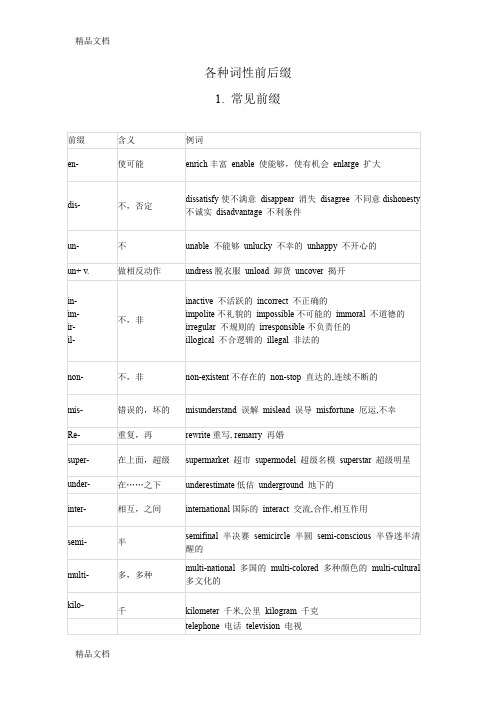
各种词性前后缀1. 常见前缀2. 名词后缀3 . 形容词后缀4. 动词后缀5. 副词后缀-ly是最常见的副词后缀, 可以附加在形容词后,构成与原形容词意义相同的副词。
如:slowly 缓慢地happily高兴地truly 真实地wholly 全部地simply 纯粹地练习1. 动词、介词、冠词、物主代词等词后一般接名词或动名词, 如果所给单词是其它词类, 就要将其改为名词, 并注意名词数的变化。
(1)Do you know the ______ (deep) of the river?(2)His _____ (careful) resulted in the terrible accident(3)He is one of the ______ (science) who support this theory.答案:(1) depth (2) carelessness (3) scientists2. 动词、介词后一般接名词或动名词, 如果所给单词为动词,就要看该动词是否有名词形式,如果有名词形式,就用其名词形式;如果该动词没有名词形式,就用其动名词。
如:(1)Please pay ________ (attend) to your handwriting.(2) His _______ (arrive) made the situation worse.(3)The teacher was angry at my _________ (come) late.答案:(1) attention (2) arrival (3) coming3. 动词前后、形容词前后可有副词。
如果所需词为副词时, 还要考虑副词级的变化。
如:(1)The boy ran ______ (quick) to school.(2)“What’s that?”Father shouted ______ (angry).(3)The little girl is ______(extreme)eager to know the result of the exam。
英语单词的前缀和后缀

英语单词的前缀和后缀一、常见前缀。
1. un -- 音标:[ʌn]- 词性:可加在形容词、副词、名词前,表示否定。
- 例如:unhappy [ʌnˈhæpi](adj. 不快乐的),unusually [ʌnˈju:ʒuəli](adv. 不寻常地),unemployment [ˌʌnɪmˈplɔɪmənt](n. 失业)2. re -- 音标:[riː]- 词性:可加在动词前,表示“再,又;重新”。
- 例如:rewrite [ˌriːˈraɪt](v. 重写),rebuild [ˌriːˈbɪld](v. 重建)3. dis -- 音标:[dɪs]- 词性:可加在动词、形容词、名词前,表示否定或相反的意思。
- 例如:dislike [dɪsˈlaɪk](v. 不喜欢;n. 厌恶),disappear [ˌdɪs əˈpɪə(r)](v. 消失),dishonest [dɪsˈɒnɪst](adj. 不诚实的)4. in -(在字母l、m、p前变为im -,在字母r前变为ir -,在字母b、n、p前变为il -)- in -音标:[ɪn],im -音标:[ɪm],il -音标:[ɪl],ir -音标:[ɪr]- 词性:可加在形容词前,表示否定。
- 例如:inactive [ɪnˈæktɪv](adj. 不活跃的),impossible [ɪmˈpɒs əbl](adj. 不可能的),illegal [ɪˈliːgl](adj. 非法的),irregular [ɪˈreɡjələ(r)](adj. 不规则的)5. pre -- 音标:[priː]- 词性:可加在动词、名词、形容词前,表示“在……之前”。
- 例如:preview [ˈpriːvjuː](v. 预习;n. 预演),prewar [ˈpriːwɔː(r)](adj. 战前的)6. post -- 音标:[pəʊst]- 词性:可加在名词、形容词前,表示“在……之后”。
(完整版)英语各种词性前后缀及习题

(完整版)英语各种词性前后缀及习题各种词性前后缀1. 常见前缀前缀含义例词en-使可能enrich 丰富enable 使能够,使有机会enlarge 扩大dis-不,否定dissatisfy 使不满意disappear 消失disagree 不同意dishonesty 不诚实disadvantage 不利条件un-不unable 不能够unlucky 不幸的unhappy 不开心的un+ v.做相反动作undress 脱衣服unload 卸货uncover 揭开inim- ir-il-不,非inactive 不活跃的incorrect 不正确的impolite 不礼貌的impossible 不可能的immoral 不道德的irregular 不规则的irresponsible 不负责任的illogical 不合逻辑的illegal 非法的non-不,非non-existent 不存在的non-stop 直达的,连续不断的mis-错误的,坏的misunderstand 误解mislead 误导misfortune 厄运,不幸Re-重复,再rewrite 重写, remarry 再婚super-在上面,超级supermarket 超市supermodel 超级名模superstar 超级明星under-在??之下underestimate 低估underground 地下的inter-相互,之间international 国际的interact 交流, 合作,相互作用semi-半semifinal 半决赛semicircle 半圆semi-conscious 半昏迷半清醒的multi-多,多种multi-national 多国的multi-colored 多种颜色的multi-cultural 多文化的kilo-千kilometer 千米,公里kilogram 千克tele-远telephone 电话television 电视在??上/里aboard 在船/火车/ 飞机上ahead 在前面向??. aside 向旁边abroad 在国外2. 名词后缀后缀含义例词n.+er相关的人farmer 农夫officer 官员v.+er 从事某种职业、进行某种活动的人teacher 教师worker 工人reader 读者writer 作家地点名词+er住在某处的人Londoner伦敦人villager 村民-ess女??actress 女演员hostess 女主人-or同er-conductor 售票员visitor 游客inventor 发明家actor 演员survivor 幸存者editor 编辑-ar同er-beggar 乞丐-ese某国人,某国语Chinese 中国人,汉语Japanese 日本人,日语-ian从事某职业的人musician 音乐家physician 医师,内科医生-ist从事某职业的人scientist 科学家dentist 牙医pianist 钢琴家artist 艺术家communist 共产主义者socialist 社会主义者-ment行为的结果argument 争论judgment 判断-ness状态, 情况,特征happiness 幸福illness 疾病-tion动作,行为dictation 听写preparation 准备-ship身份,状态leadership 领导friendship 友谊citizenship 国籍;公民权-anceacceptance 接受appearance 外表;出现-enceconfidence 信息reference 参考n.+ful 以该名词容量为单位的量glassful 一杯mouthful 一口plateful 一盘spoonful一羮匙-al refusal 拒绝denial 抵赖arrival 到达approval 赞成;批准burial 埋葬;葬礼survival 幸存-ydifficulty 困难possibility 可能性-ism socialism 社会主义materialism 唯物主义3形容词后缀后缀例词-al industrial 工业的national 国家的, 民族的-an European 欧洲的American 美国的,美洲的-erneastern东方的northern 北方的southern 南方的-ablereasonable 合理的believable 可相信的unbearable 难以忍受的-fulcareful 仔细的,小心的cheerful 兴高采烈的beautiful 美丽的-ishchildish 孩子般的selfish 自私的foolish 愚蠢的-iveactive 活跃的,积极的creative 创造性的destructive 破坏的;毁灭性的-y thirsty 口渴的dirty 脏的windy 有风的-engolden 金色的,金的wooden 木的,木质的woolen 羊毛的-ous continuous 持续的various 各种各样的-ary imaginary 幻想的revolutionary 革命的-ic realistic 现实的historic 历史的-sometroublesome 麻烦的lonesome 孤独的, 寂寞的-likechildlike 孩子般的,单纯的womanlike 女人般的-ly friendly 友好的lovely 可爱的-lesscareless 粗心的harmless 无害的homeless 无家可归的useless 无用的4. 动词后缀后缀含义例词-en 使??成为, 使??具有widen 加宽sharpen 削尖deepen 加深strengthen 加强shorten 缩短soften 软化quicken 加快adj. +ize 使??变成, 使??化Americanize 美国化civilize 使开化modernize 现代化nationalize 国有化-y使??化beautify 美化simplify 简化5. 副词后缀-ly 是最常见的副词后缀, 可以附加在形容词后,构成与原形容词意义相同的副词。
(完整版)初中英语常见的前缀和后缀

初中英语常见的前缀和后缀一、前缀1. un-不unhappy不高兴, unlike不像, unusual不寻常, unfriendly不友好, unbalanced 不平衡的, uncover揭露, unwrapped打开的,2. im-in-不impossible不可能的,immoral不道德的, informal不正式的,incomplete, incorrect,ignorance3. bi-两,双cycle轮子---bicycle自行车4. com-共同combine, compete5. dis-反对,不courage勇气---discourage使灰心dislike不喜欢(dis like喜爱→不喜爱)disorder无秩序(dis order顺序→没有顺序)dishonest不诚实的(dis honest诚实的)disappear消失(dis appear出现→不出现→消失)discover发现(dis cover 盖→把盖揭开→发现)6. ab-不normal正常的---abnormal不正常的7. non-非party党---nonparty无党派的, verbal口头的---nonverbal非口头的, mental精神的---nonmental非精神的8. re-再一次view观看---review再一次观看-引申为复习,评论action行动—reaction反应,replay(re play播放→重放,回放)二、后缀1. -less没有(形容词后缀)例:careless粗心的, hopeless没有希望的, count数---countless数不清的, homeless无家可归的, endless无止境的,无尽的, useless没用的, helpless无助的2. -ful充满的(形容词后缀)careful(care关心ful→小心的,认真的), colorful五彩缤纷的, meaningful 有意义的, wonderful(wonder奇迹ful→精彩的), beautiful美丽的,successful成功的,useful有用的的,forgetful健忘的3. -ment行为(名词后缀)excitement兴奋(excite使兴奋ment→兴奋), enjoyment喜欢, movement 运动,development发展, treatment对待,治疗, entertainment娱乐, disappointment失望,encouragement鼓4. -ive(形容词后缀)effective(effect效果ive→有效的), subjective主观的, objective客观的5. -er(表人的后缀)Teacher老师, cleaner清洁工, runner跑步者, traveler旅行者, winner赢家, singer歌手, writer作家,driver司机, worker工人, leader领导, foreigner外国人, farmer农民6.-or(表人的后缀)actor演员, inventor发明家, visitor参观者7.-ist(表人的后缀)Tourist观光者, dentist牙医,guitarist吉他手8.-ly(副词后缀)Badly坏地, quickly快地, carefully认真地,仔细地, happily高兴地, deeply深深地lucky ---luckily幸运地usual---usually通常地noisy---noisily有噪音地slow--- slowly慢慢地angry ---angrily生气地strong--- strongly强烈地quiet ---quietly静静地特例:(以不发音的e结尾的形容词,去掉e再加ly)true ---trulyterrible ---terriblypossible ---possibly9.-y(形容词后缀)rain rainy下雨的; luck lucky幸运的;cloud cloudy多云的; noise noisy有噪音的;wind windy刮风的; health healthy健康的; snow snowy下雪的(双写,加-y)sun sunny晴朗的10.-ion(名词后缀)invent invention发明; educate, education教育; graduate, graduation毕业;relate,relation关系;operate, operation操作; instruct, instruction指导; translate,translation翻译; inform通知--- information信息; direct指向--- direction 方向;suggest, suggestion建议11.-ness(名词后缀)good goodness好意; brave勇敢的,bravery, braveness(勇敢,华饰);nervous 紧张的,nervousness; nerve神经。
构词法中常见的动词前后缀,用法及其填空检测汇总(完整版)

构词法中常见的动词前后缀,用法及其填空检测汇总(完整版)一.构词法中常见的动词前后缀及其用法汇总:1. dis-:obey v.遵守,顺从——disobey v.违反like v.喜欢——dislike v.不喜欢appear v.出现——disappear v.消失cover v.覆盖——discover v.发现,揭露advantage n.优点——disadvantage n.缺点agree v.同意,赞成——disagree v.不同意obey v.遵守,服从——disobey v.违抗,不顺从2. mis-:understand v.理解;体谅——misunderstand v.误解;误会lead v.指导——mislead v.误导take v.拿走——mistake v.误拿3. re-:write v.写——rewrite v.重写use v.使用——reuse v.再使用consider v.考虑——reconsider v.再三思考cycle v.转圈——recycle v.回收4. en-:rich adv.富裕的——enrich v.使富裕able adj.有能力的——enable v.使能够large adj.大的——enlarge v.使变大;扩大courage n.勇气——encourage v.鼓励danger n.危险——endanger v.使濒危5. -fy/-ify:simple adj.简单的——simplify v.简化beauty n.美——beautify v.美化6. -en:strength n.强项;长处;力量——strengthen v.加强wide adj.宽广的——widen v.加宽fast adv.快地——fasten v.系,拴weak adj.虚弱的——weaken v.减弱length n.长度——lengthen v.加长short adj.短的;矮的——shorten v.缩短7. -ize/-ise:apology n.道歉,致歉——apologize v.道歉advice n.建议——advise v.建议modern adj.现代的——modernize v.使现代化二.构词法中常见的动词前后缀,用法及其填空检测汇总:1. dis-:obey v.遵守,顺从——_______________ v.违反like v.喜欢——_______________ v.不喜欢appear v.出现——_______________ v.消失cover v.覆盖——_______________v.发现,揭露advantage n.优点——_______________ n.缺点agree v.同意,赞成——_______________ v.不同意obey v.遵守,服从——_______________ v.违抗,不顺从2. mis-:understand n.理解;体谅——____________v.误解;误会lead v.指导——_______________ v.误导take v.拿走——_______________v.误拿3. re-:write v.写——_______________v.重写use v.使用——_______________ v.再使用consider v.考虑——_______________ v.再三思考cycle v.转圈——_______________ v.回收4. en-:rich adv.富裕的——_______________ v.使富裕able adj.有能力的——_______________ v.使能够large adj.大的——_______________ v.使变大;扩大courage n.勇气——_______________ v.鼓励danger n.危险——_______________ v.使濒危5. -fy/-ify:simple adj.简单的——_______________ v.简化beauty n.美——_______________v.美化6. -en:strength n.强项;长处;力量——_______________ v.加强wide adj.宽广的——_______________ v.加宽fast adv.快地——_______________ v.系,拴weak adj.虚弱的——_______________ v.减弱length n.长度——_______________ v.加长short adj.短的;矮的——_______________ v.缩短7. -ize/-ise:apology n.道歉,致歉——______________ v.道歉advice n.建议——_______________ v.建议modern adj.现代的——_____________ v.使现代化。
(完整版)英语词性后缀

后缀-名词后缀常见的此类后缀及其具体含义如下:1. -ster, -eer, -er(or)意为: 从事某种职业或参与某种活动的人(person engaged in an occupation or activity)例词: gamester, gangster, songster, engineer, profiteer, mountaineer, auctioneer, driver, teacher, director, actor, professor2.-let意为: 小或者不重要的东西(small, unimportant things)例词: booklet, leaflet, starlet3. -ette意为: 1)小的东西(small)例词: cigarette 2)假的东西(imitation)例词: leatherette 3)女性(female)例词: usherette4. -ess意为: 女性(female)例词: actress, poetess, hostess, paintress5. -hood意为: 时期(status;etc. )例词: boyhood男孩时代, childhood 童年, manhood成年男子6. -ship意为: 才能, 状态, 资格, 品质等(skill, state, condition, status, quality)例词: leadership领导才能, friendship友谊, membership 会员资格, lectureship讲师, sportsmanship运动精神7. -ful意为: 量(the amount which noun contains)例词: cupful, handful, mouthful, spoonful8. -tion, -ion意为: 1)状态, 行动等(state;action;etc. )例词: action 动作, oppression苦恼, possession财产, education教育)。
英语中常见的50前缀后缀
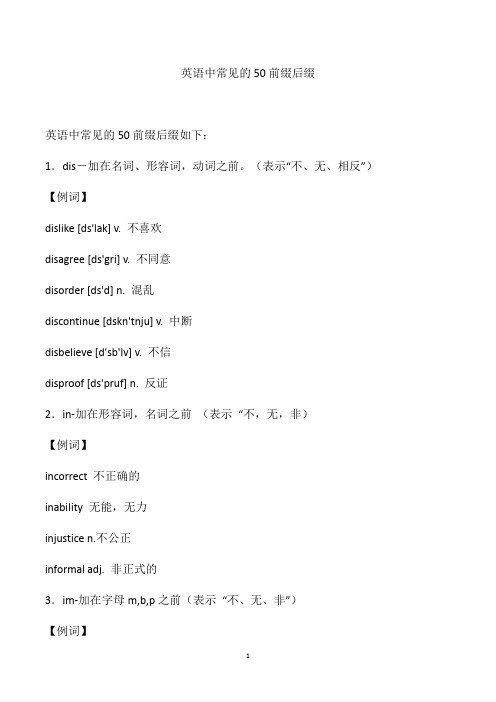
英语中常见的50前缀后缀英语中常见的50前缀后缀如下:1.dis-加在名词、形容词,动词之前。
(表示“不、无、相反”)【例词】dislike [ds'lak] v. 不喜欢disagree [ds'gri] v. 不同意disorder [ds'd] n. 混乱discontinue [dskn'tnju] v. 中断disbelieve [d'sb'lv] v. 不信disproof [ds'pruf] n. 反证2.in-加在形容词,名词之前(表示“不,无,非)【例词】incorrect 不正确的inability 无能,无力injustice n.不公正informal adj. 非正式的3.im-加在字母m,b,p之前(表示“不、无、非”)【例词】impossible adj. 不可能的immemorial adj. 古老的,无法记忆的impudence 厚颜无耻4.il-加在以l开头的词前i??-否定(?代指两个相同的辅音字母)(表示“不、无、非”)【例词】illegal ['lgl] adj. 非法的illogical ['lɑdkl] adj. 不合逻辑的,不合理的5.ir-加在以r开头的词前(表示“不、无”)【例词】irregular ['regjl(r)] adj. 不规则的irregular 不稳定的irresistable 不可抵抗的irresolvable 不能分解的,不能解决的6.un-加在名词,形容词,副词之前【例词】unfinished 未完成的undoubted 无疑的unemployment 失业7.non-加在形容词,名词前【例词】non-existence 不存在non-essential 不主要的non-electrical 非电的8.mis-加在动词、名词之前(表示“错误”)【例词】misuse [ms'juz] v. 乱用mistake [m'stek] n. 错误misfortune [ms'ftun] n. 不幸misjudge 误判misleading 误导9.dis-加地动词之前【例词】disappear 消失disarm 解除武装disconnect 失去联系10.de-加在名词,形容词之前【例词】demobilize 遣散;使…复员decolor 脱色, 漂白11.anti-加在名词、形容词之前(表示“反对”)【例词】antibody n. <医>抗体antiwar adj. 反战的,反对战争的antidite 解毒药12.counter-加在名词、动词前(表示“相反的”)【例词】countermeasure n. 对策,应策counterbalance v. 对…起平衡作用,抵消;countermand v. 取消(命令),撤回;counterrevolution 反革命13. contra- (表示“反对”)【例词】contradiction [kɑntr'dkn] n. 矛盾contradict [kntr'dkt] v. 反驳;否认;与…矛盾contrary [ 'kntrr] adj. 相反的;对立的contravene [kntr'vin] v. 抵触;违反;否定14. ab-(表示“不”或者"变坏,离去")【例词】abnormal [b'nml] adj. 不正常的absent [ 'bsnt] adj. 缺席的,不在场的15. re- (表示“相反、反对”)【例词】reaction [r'k()n] n. 反应、反作用reverse [r'vs] adj. 相反的resist [r'zst] v. 反抗、抵抗revolt [r'vlt] v. 反叛、造反16. pre- (表示“前,预先”)【例词】previous ['privs] adj. 以前的;早先的prehistory [pri'hstr] adj. 史前的preschool ['priskul] adj. 幼儿园、学龄前的predetermine [prid'tmn] v. 预定17. pro- (表示“向前、在前”)【例词】progress ['prgres] n. 前进、发展prospect ['prspekt] n. 展望protraction [pro'trkn] n. 伸长18. proto- (表示“原始”)【例词】protohuman ['prt'hjumn] n. 早期原始人prototype ['prttap] n. 原型19. Ante- (表示“以前的,原前的” )【例词】antecedent [an·te'ced·ent] n. 祖先;adj. 在前的,在先的antedate [nt'det] v. 比…为早;先于20. Fore- (表示“前部,提前”)【例词】forehead n. 前额forearm n. 前臂forecast n./v. 预测foreground n. 前景21.Pro-【例词】programme 计划prologue 序幕22.Ex-【例词】ex-president 前任总统ex-wife 前妻23.post- (表示”后“)【例词】posthumous ['pstjms] adj. 父亲死后出生的postpone [po'spon] v. 推迟postscript ['ps(t)skrpt] n. 编后记24. re- (表示“回、向后”)【例词】retreat [r'trit] n. 撤退、退休、降旗仪式return [r'tn] v. 归回,收回recollect [,rek'lekt] v. 回忆,忆起recall [r'kl] v. 召回、回忆rebound [r'band] v . 弹回、重新振作25. re- (表示“再、重复、重新”)【例词】reprint [ri'prnt] v. 重印、再版reproduction [ripr'dk()n] n. 繁殖、复制restart [ri'stɑt] v. 重新开始reconsider [rikn'sd] v. 重新考虑re- (表示“相反、反对”)【例词】reaction [r'k()n] n. 反应、反作用reverse [r'vs] adj. 相反的resist [r'zst] v. 反抗、抵抗26. step- (表示“后,继”)【例词】stepfather ['stepfɑ] n. 继父stepchild ['steptald] n. 前夫或前妻的孩子stepbrother ['stepbr] n. 异父(母)兄弟27. Retro-【例词】Retrograde 倒退的retrospect 回顾28. with- (表示“向后、相反”)【例词】withdraw [w'dr] v. 收回、撤退withstand [w'stnd] v. 抵挡、反抗withhold [w'hld] v. 阻止29.Infra-【例词】Infra-red 红外线infrahuman 低于人类的infrasonic 亚声的,次声的30.Sub- (表示“下,次,下一级的”)【例词】Sub-editou 副编辑sub-conscious 下意识的submarine 海下的subtropical 亚热带的subtitle 副标题subnormal [sb'nm()l] adj. 低于正常的subarea ['sbεri] n. 分区suboffice ['sb,fs] n. 分办事处31. de- (表示“向下,减慢,变坏”)【例词】deplane [di'plen] v. 下飞机detrain [di'tren] v. 下火车dethrone [d'θrn] v. 使脱离王位,废黜derail [d'rel] v. 使(火车)脱轨devalue [di'vlju] v. 使(货币)贬值;贬低32.Co- (表示“共同一起”)【例词】coaction [k'kn] n. 共同行动cooperate [k'pret] v. 合作coeducation [kedju'ken] n. 男女同校cohere [k'h] v. 黏合;联合;结合33. com- (表示“一起”)【例词】combine [km'ban] v. 联合,结合compatriot [km'ptrt] n. 同胞,同国人34. com- (表示“加强意义”)【例词】compress [km'pres] v. 压缩compact ['kmpkt] v. 压紧,(使)坚实35. con- (表示“一起,合并”)【例词】contemporary [kn'temprr] adj. 同时代的consolidate [kn'sldet] v. 合并;巩固,加强;统一confluence [ 'knflns] n. 汇合处;汇流congregate [ 'kgrget] v. 使集合,聚集36.cor-,col-共同,和,完全【例词】correlation 相互关系corruption 贪污腐败collaborate 合作,合著collect 收集37.sym-(表示“共同、相同”)【例词】sympathy ['smpθ] n. 同情symphony ['smf()n] n. 交响曲symmetry ['smtr] n. 对称38. syn-(表示“共同、相同”)【例词】synactic [s'nktk] adj. 共同作用的synonym ['snnm] n. 同义字synchronize ['skrnaz] v. 使同步synchronous ['skrns] adj. 同时的synthetic 人工的,合成的co- =con-=com-在一起,强调39.Inter- (表示在...之间、...之际,相互)【例词】intercontinental adj.洲际的international adj.国际的interline v. 插写进去interoceanic adj. 大洋间的interact ['nt'rkt] v. 相互作用intermarry v. 通婚,近亲结婚40.Ec-【例词】Eclipse 蚀ecstasy 狂想41.Extra-【例词】Extraordinary 非凡的extramural 校外的extrasensory 超感觉的42. e-(表示“出、外”)【例词】eject ['dekt] v. 投出,掷出emigrate ['emgret] v. 移居外国elect ['lekt] v. 选出emit ['mt] v. 发射出emerge ['md] v. 浮出,出现erupt ['rpt] v. 喷出evade ['ved] v. 逃出effluence ['eflns] n. 发出,发射物;射出43. ex- (表示“出,出去”)【例词】exclusive [k'sklusv] adj. 不包括...的exclude [k'sklud] v. 排除,不包括;排斥;驱除expose [k'spz] v. 揭露44. exit ['ekst] n. 出口【例词】extract [k'strkt] n. 抽出,拔出expel [k'spel] v. 驱逐;赶走;排出(气体等)expose [k'spz] v. 揭露,揭发45.hyper-, preter-, super-, sur-, ultra-【例词】hyper-sensitive 过敏的preterhuman 超人的46. sur- (表示“上、外、超”)【例词】surface ['sfs] n. 表面surrealism [s'rlz()m] n. 超现实主义surpass [s'pɑs] v. 超过surcoat ['skt] n. 外套、女外衣surtax ['stks] n. 附加税surprint ['sprnt] v. 加印于...上surround [s'rand] v. 包围/环绕surplus ['spls] n. 剩余、盈余47. trans- (表示“越过、横过、超”)【例词】transnational [trns'nnl] adj. 超越国界的transcontinental [,trnz,kɑnt'n ntl] adj. 横穿大陆的transnormal [trns'nml] adj. 超出常规的transpersonal [trnz'psnl] adj. 超越个人的transmarine [,trnzm'rin] adj. 横越海洋的、海外的transfrontier [trns'frntj] adj. 在国境外的trans- (表示“转移、变换”)【例词】transform [trns'frm] v. 改变transposition [,trnzp'zn] v. 调换transcode [trnz'kod] v. 译密码,转换代码transmigrate [,trnsma'ɡret] v. 移居transplant [trns'plnt] v. 移植transship [trns'p] v. 转船(车)transport ['trnsprt] v. 运输translate [trns'let] v. 翻译48. ultra- (表示“超、以外”)【例词】ultrasonic [ltr'snk] adj. 超声的ultrared [,ltr'red] adj. 红外线的ultramodern [,ltr'mdn] adj. 超现代化的ultramarine [,ltrm'rin] adj. 海外的ultra-violet n. 紫外线49.Demi-【例词】demilune 半月,新月50. hemi- (表示“半”)【例词】hemisphere n. 半球hemicycle n. 半圆形hemicrania n. 偏头疼。
六年级英语前缀后缀单选题50题

六年级英语前缀后缀单选题50题1.He is unhappy because he failed the exam.unhappy 的意思是“不开心的”,其中前缀“un-”表示“不”。
A.happyB.unhappyC.sadD.clever答案:B。
本题考查前缀“un-”表示否定的用法。
A 选项“happy”是“开心的”;C 选项“sad”是“伤心的”;D 选项“clever”是“聪明的”。
题干中明确表示“因为考试不及格而不开心”,所以答案是B。
2.She reread the book to understand it better.“reread”的意思是“重新读”,前缀“re-”表示“再次”。
A.readB.rereadC.writeD.draw答案:B。
本题考查前缀“re-”的用法。
A 选项“read”是“读”;C 选项“write”是“写”;D 选项“draw”是“画”。
题干中说“为了更好地理解这本书,她重新读了一遍”,所以答案是B。
3.The boy is dishonest. He often tells lies.“dishonest”的意思是“不诚实的”,前缀“dis-”表示“不”。
A.honestB.dishonestC.kindD.clever答案:B。
本题考查前缀“dis-”的用法。
A 选项“honest”是“诚实的”;C 选项“kind”是“善良的”;D 选项“clever”是“聪明的”。
题干中说“这个男孩不诚实,他经常说谎”,所以答案是B。
4.The teacher asked us to review our lessons.“review”的意思是“复习”,前缀“re-”表示“再次”。
A.studyB.reviewC.playD.sleep答案:B。
本题考查前缀“re-”的用法。
A 选项“study”是“学习”;C 选项“play”是“玩”;D 选项“sleep”是“睡觉”。
- 1、下载文档前请自行甄别文档内容的完整性,平台不提供额外的编辑、内容补充、找答案等附加服务。
- 2、"仅部分预览"的文档,不可在线预览部分如存在完整性等问题,可反馈申请退款(可完整预览的文档不适用该条件!)。
- 3、如文档侵犯您的权益,请联系客服反馈,我们会尽快为您处理(人工客服工作时间:9:00-18:30)。
各种词性前后缀1. 常见前缀
2. 名词后缀
3 . 形容词后缀
4. 动词后缀
5. 副词后缀
-ly是最常见的副词后缀, 可以附加在形容词后,构成与原形容词意义相同的副词。
如:slowly 缓慢地happily高兴地truly 真实地wholly 全部地simply 纯粹地
练习
1. 动词、介词、冠词、物主代词等词后一般接名词或动名词, 如果所给单词是其它词类, 就要将其改为名词, 并注意名词数的变化。
(1)Do you know the ______ (deep) of the river?
(2)His _____ (careful) resulted in the terrible accident
(3)He is one of the ______ (science) who support this theory.
答案:(1) depth (2) carelessness (3) scientists
2. 动词、介词后一般接名词或动名词, 如果所给单词为动词,就要看该动词是否有名词形式,如果有名词形式,就用其名词形式;如果该动词没有名词形式,就用其动名词。
如:
(1)Please pay ________ (attend) to your handwriting.
(2) His _______ (arrive) made the situation worse.
(3)The teacher was angry at my _________ (come) late.
答案:(1) attention (2) arrival (3) coming
3. 动词前后、形容词前后可有副词。
如果所需词为副词时, 还要考虑副词级的变化。
如:
(1)The boy ran ______ (quick) to school.
(2)“What’s that?”Father shouted ______ (angry).
(3)The little girl is ______(extreme)eager to know the result of the exam。
(4). He was very tired after doing this for a whole day, but he felt very happy since the crop did “grow”______ (height).
答案:(1) quickly (2) angrily (3) extremely (4) higher
4. 在名词前作定语,在系动词后做表语,以及作主语或宾语的补足语时,通常要用形容词如果所需词为形容词时, 还要考虑形容词级的变化。
(1) What’s the ________ (width) river in the world?
(2) The _______ (strength) we become, the more modest we should be.
答案:(1) widest (2) stronger
5即时训练
单句填空:用所给单词的适当形式填空。
1. Mary was very ______ at the news, so she looked ______ at her husband, her eyes full of
______ (sad).
2. He ________football very well and he was one of the best ______ in yesterday’s football match. (play)
3. Look! How ________ Kate is laughing! She seems to be the ______ girl in the world (happy).
4. To our ______, the headmaster was very ______ with our report. (satisfy)
5. Edison was a great ________. During his life he had many ______. (invent)
6. I should ________ my task and make it ________ to finish it. (simple)
7. The boy having the ________ of being half starved ________, never to be seen again. (appear)
8. The police _____ the pot and ______ a plot against the President. (cover)
9. You are so _______ to help me. Thank you for your ________. (kindly)
10. Everything is becoming ____________ than before and many college students had to work to make some mone y for their college _____________. (expend)
语篇填空:用所给词的适当形式填空
A
Rafting is an___1__ (excite) adventure. A raft is a small boat that you can use to paddle down rivers and streams. Rafting is a good way to experience___2___(natural) . If you want a normal rafting trip, choose a quiet stream or river that is wide and has few fallen trees or rocks. If you are looking for more___3___(excite), you may want to try whitewater rafting. Whitewater rafting is___4___(adventure) and___5___(difficulty) than normal rafting. It is done on rivers and streams where the water moves___6___ (quick). You have to be___7___ (care) not to hit rocks, trees and other___8___ (dangerous). The name “Whitewater”comes from the fact that the water in these streams and rivers looks white when it moves quickly.
B
Steve Jones is an___1___(environment) expert who tries to keep animals and plants from___2___(become) endangered. If we know more about what causes___3___ (danger), we may be able to take measures before it is too late. A species can become ___4___ (endanger) for___5___ (differ) reasons. Animals and plants must have a habitat or home, which is___6___ (comfort) and clean, and where there is enough food and other resources. Otherwise they can not live___7___ (comfortable). They are all used to their environment; that is, they have learnt how to live___8___ (succeed) in their habitat.
【参考答案】
一、单句填空
1. sad, sadly, sadness
2. played, players
3. happily, happiest
4. satisfaction, satisfied
5. inventor; inventions
6. simplify, simpler/simple
7. appearance, disappeared 8. discovered, uncovered
9. kind, kindness 10. more expensive, expenses
二、语篇填空
A. 1. exciting 2. nature 3. excitement 4. adventurous 5. difficult
6. quickly
7. careful
8. dangers
B. 1. environmental 2. becoming 3. endangerment 4. endangered
5. different
6. comfortable
7. comfortably
8. successfully。
